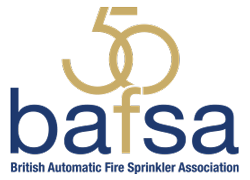With school exam season now in full swing, BAFSA (The British Automatic Fire Sprinkler Association) is reminding the Government and education authorities, as part of this year’s Sprinkler Week (20-25th May), about the increased threat of fire to schools during the summer term – a time when pupils and staff are under most stress.
According to the Government’s own data, less than 8.5% of new schools built since 2015 have automatic fire sprinklers fitted and yet there were around 300 fires in schools in 2023 (1). However, schools fitted with sprinklers that experience a fire are often back in action the same day, as opposed to the two years that it typically takes to rebuild a school after a major fire.
Sprinklers dramatically reduce the effect a fire can have on a school, often limiting damage to one room. They prevent the loss of valuable student coursework and school children having their studies disrupted due to their classrooms being destroyed or severely damaged.
BAFSA has, along with several other fire safety organisations, including the NFSN and NFCC, taken this opportunity to write an open letter to the Secretary of State for Education, the Rt Hon Gillian Keegan MP, to urge the Government to press forward with its proposed revision of Building Bulletin 100, a design guide for fire safety in schools, to mandate the installation of automatic fire suppression systems in all new schools.
The letter states: “It is deeply concerning that BB100 – which was necessary to provide fire safety measures specifically for schools, that were beyond Approved Document B and BS9999, to protect the continuity of education has become outdated and disregarded.”
The chief executive of BAFSA, Ali Perry, added, putting sprinklers in schools makes economic sense. “The impact of school fires is much greater than the financial cost of any rebuild. But there is the emotional cost too. Schools work hard to establish a positive culture and build relationships which are shattered when pupils and staff are displaced due to fire.”
Increased risk
According to Zurich Municipal, who are supporting BAFSA’s Sprinkler Week campaign, fires in education centres are a large and ongoing issue and have been for some time.
To prevent blazes from occurring, Governments in Scotland and Wales have already introduced rules to mandate the installation of sprinklers in all new-build and majorly refurbished schools.
Paul Redington, Regional Major Loss Manager for Zurich said: “for several years, Zurich has called on the Government to bring English schools into line with the rest of Britain, but so far, we have yet to see any movement.”
Redington added: “The traditional fire risks of arson, and “hot works” are supplemented by the increase in complex electronic equipment in schools, and the growing trend among young people to use disposable vapes which contain lithium-ion batteries that can ignite if damaged or disposed of incorrectly.”
Terry McDermott secretary of the National Fire Sprinkler Network (NFSN) added, “Any decision to remove the requirement for sprinklers in new schools would be a retrograde step.
Schools are critical buildings in local communities. Whilst it is accepted that there has not been a loss of life in a school fire, the impact of the loss of a school is devastating for the children, parents and the community.”
1: Freedom of Information request based on 39 out of 45 UK Fire and Rescue Services contacted by Zurich Municipal (2024)
